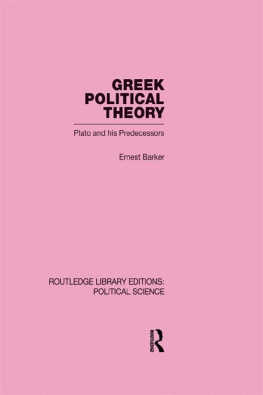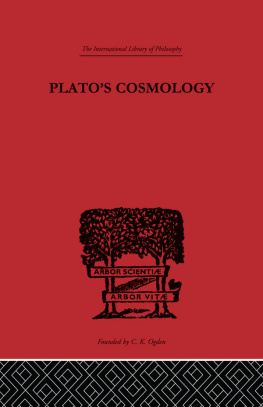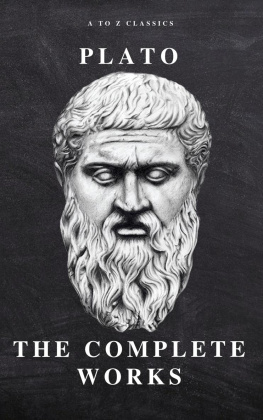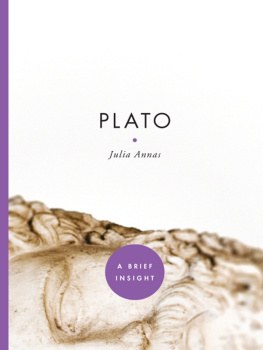
ROUTLEDGE LIBRARY EDITIONS: POLITICAL SCIENCE
GREEK POLITICAL THEORY
GREEK POLITICAL THEORY
Plato and his Predecessors
By
SIR ERNEST BARKER
Volume 18

First published 1918
This edition first published in 2010
by Routledge
2 Park Square, Milton Park, Abingdon, Oxon, OX14 4RN
Simultaneously published in the USA and Canada
by Routledge
270 Madison Avenue, New York, NY 10016
Routledge is an imprint of the Taylor & Francis Group, an informa business
1918 Sir Ernest Barker
All rights reserved. No part of this book may be reprinted or reproduced or utilised in any form or by any electronic, mechanical, or other means, now known or hereafter invented, including photocopying and recording, or in any information storage or retrieval system, without permission in writing from the publishers.
British Library Cataloguing in Publication Data
A catalogue record for this book is available from the British Library
ISBN 10: 0415491118 (Set)
ISBN 13: 9780415491112 (Set)
ISBN 10: 0415555531 (Volume 18)
ISBN 13: 9780415555531 (Volume 18)
Publishers Note
The publisher has gone to great lengths to ensure the quality of this reprint but points out that some imperfections in the original copies may be apparent.
Disclaimer
The publisher has made every effort to trace copyright holders and would welcome correspondence from those they have been unable to trace.
Greek Political Theory
PLATO AND HIS PREDECESSORS
Sir Ernest Barker
METHUEN
LONDON and NEW YORK
First published in 1918 by
Methuen & Go. Ltd
Reprinted six times
Fifth edition and first published as a University Paperback in 1960
Reprinted five times
Reprinted 1979
Published in the USA by
Methuen & Go.
in association with Methuen, Inc.
733 Third Avenue, New York, NY 10017
Printed in Great Britain by
Richard Clay (The Chaucer Press), Ltd
Bungay, Suffolk
ISBN 0 416 67530 1
All rights reserved. No part of this book may be reprinted or reproduced or utilized in any form or by any electronic, mchanical or other means, now known or hereafter invented, including photocopying and recording, or in any information storage or retrieval system, without permission in writing from the publishers.
Preface to the First Edition
In 1906 a book the first book of the writer, with all (and perhaps more than all) the imperfections of a first book was published under the title of The Political Thought of Plato and Aristotle. Some time before the outbreak of the war the publishers stock was exhausted; and the writer, alike under his contract with the publisher, who was anxious for a new edition, and under his feeling of obligation to students of the subject, felt himself bound to take in hand the preparation of a new recension of the work.
It was his original intention simply to correct the errors and prune away the redundancies which were many of the original edition. But a great deal of work had been done since 1906, which touched the subject he had originally sought to cover: his own ideas had matured; and after a time he came to the conclusion that it was better to rewrite the original work, using fully the new material and his own maturer judgement, and planning the whole on a juster and more proportionate scale. He determined accordingly to write a history of Greek Political Theory in two volumes, of which the first and longer volume should be devoted to Plato and his Predecessors, and the second and shorter to Aristotle and his Successors. The first of these volumes is here printed: the second the writer hopes to finish as soon as the position of national affairs justifies him in undertaking such work. For the present other duties have a prior claim.
The first chapter of the volume is the introduction of the original edition, with some modifications. The second is entirely new. The third, fourth, and fifth chapters correspond, to some extent, to the first chapter of the original work; but there is little left which the reader of the older form will recognize. The sixth and seventh chapters represent a complete revision of the substance of the second chapter of the earlier work. The eighth to the eleventh chapters correspond to the third chapter of the old form; but the eleventh chapter is entirely, and much of the rest very largely, new. The rest of the work, while it corresponds to the fourth chapter of the first edition, is entirely rewritten; and hardly more than a few paragraphs of the older form survive. The appendix contains a revision and amplification of the substance of the first appendix of the old work.
The writer is perhaps justified in stating that it is an entirely new work which is here printed. The justification is to some extent also a condemnation. It is not usual, and it is perhaps not proper, to treat a poor book so. Litera scripta manet; and a writer ought to treat even himself with some reverence, if only for the sake of the possessors of his original work. These, however, are days of reconstruction; and it seemed best, on the whole, to reconstruct fearlessly, and to think of the new generation which, in other and happier days, might do the writer the honour of reading his book.
The writing of the book has been pure pleasure pleasure which the writer has often doubted whether he had the right to enjoy. The reader will notice signs of the times in which the book has been written; but it is hoped that they are not obtrusive. Plato has come to mean more for the writer, on many points, than he would have meant if the war had not stirred the deeps. On many issues the issue of might against right (pp. 816); the meaning of militarism (pp. 3458); the character of international relations (pp. 30711); and the scope of a true national education () it was impossible not to feel that a new feeling for an old message came from the circumstances and environment of the times. But the writer ventures to hope that his critics will not be led by this confession to think that he has not sought to understand Plato sub specie ternitatis (or, at any rate, sub specie temporum suorum) and to explain Platonic philosophy, as faithfully and as sympathetically as he could, in itself and according to the pure Idea.
The features in the work which the writer would commend to the notice of his readers are the attempt, in the second chapter, to illustrate the characteristics of the Greek State: the passage, in , dealing with the newly discovered fragments of the Sophist Antiphon; and the chapters devoted to the Laws. These last chapters will have done their work if they succeed in interesting some English readers in the most neglected, and yet in many ways the most wonderful and the most modern (or medieval) of all the writings of Plato. If they should stimulate any scholar to publish, what is sadly needed, an edition of the Laws on the scale of Newmans great edition of the Politics, the writer will feel himself richly rewarded.
Of all the debts which the writer owes to Greek scholars none is more profound than that to Professor Burnet, whose massive erudition and sane judgement have in many passages been his guide. Other debts he has sought to acknowledge in their place; but there is one debt, which is a debt of affection, which he would like to acknowledge here. Mr Sidney Ball, of St Johns College, has generously read the proofs: he has, in many sessions, discussed difficulties with the writer; and while he is responsible for nothing which is amiss, he is responsible for much which is not amiss. Words cannot repay the debt which is not the only debt owed to him by the writer.
Next page













